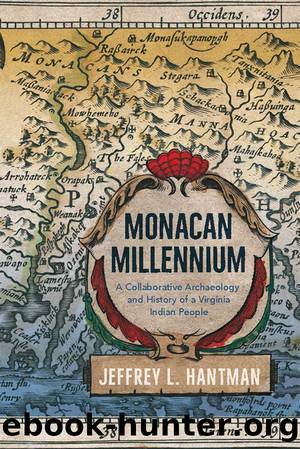Monacan Millennium by Jeffrey L. Hantman

Author:Jeffrey L. Hantman [Hantman, Jeffrey L.]
Language: eng
Format: epub
Tags: Social Science, Archaeology, History, United States, State & Local, South (AL; AR; FL; GA; KY; LA; MS; NC; SC; TN; VA; WV)
ISBN: 9780813941486
Google: luhWDwAAQBAJ
Barnesnoble:
Publisher: University of Virginia Press
Published: 2018-10-23T01:07:52+00:00
FOUR
Colonial Entanglements
Why Was Jamestown âAllowedâ to Survive?
IN THIS CHAPTER I examine the engagement between the Powhatans and the English at Jamestown in 1607 and the role of the Piedmont Monacans in the events that transpired in that curious and critical moment. The boundaries of Monacan territory were changing and permeable in multiple directions. Yet, when asked by John Smith how many worlds he knew, the Piedmont Siouan Amoroleck answered that âhe knew only three that were under the skie that covered him, which were the Powhatans, the Monacans and the Massawomecks.â Beyond that, he said, he knew nothing because âthe woods were not burntâ (no one lived there) (Barbour 1986, II: 175â76.) The Monacans in this time were distinct from their neighbors and conceived as such by one of their own.
The seven centuries prior to European colonization were characterized by the formation of increasingly bounded polities across the Middle Atlantic region, a phenomenon with some evidence (e.g., pottery, language) extending back as early as A.D. 200. In the early colonial era, the apparent dialectic between the Powhatans and Monacans is enlightening. As explained in the introduction, my reading of the ethnohistoric literature of the early Jamestown era suggests that it is the opposition between the Powhatans and the Monacans that serves to define each polity in its internal sociopolitical and economic structure and in its foreign relations. Not only their enmity and their exchange relations but also their contested and shifting boundary at the falls of the rivers define each people at the moment of European settlement. Early English colonists believed this, too, offering almost as soon as they arrived in Virginia that they were here for the Powhatans, to defeat a common Monacan enemy. As detailed in chapter 1, based on some prior knowledge, the English concocted a story of Monacan aggression to persuade the Powhatans of that shared enemy immediately upon their entry into the Chesapeake Bay.
Understanding the history of this opposition, as well as English misunderstandings of the oppositionâs fluidity over time, helps us address the puzzle of why 104 Englishmen were allowed to settle in the territory of some 14,000 Powhatans and establish a beachhead for the first permanent English colony in America. Addressing this particular question provides critical understandings of both Monacan and Powhatan cultures in this early colonial moment and establishes a foundation from which to understand the radical social transformations to come over the next four hundred years.
Download
This site does not store any files on its server. We only index and link to content provided by other sites. Please contact the content providers to delete copyright contents if any and email us, we'll remove relevant links or contents immediately.
| Anthropology | Archaeology |
| Philosophy | Politics & Government |
| Social Sciences | Sociology |
| Women's Studies |
Mysteries by Colin Wilson(3456)
People of the Earth: An Introduction to World Prehistory by Dr. Brian Fagan & Nadia Durrani(2739)
Ancient Worlds by Michael Scott(2690)
The Splendid and the Vile by Erik Larson(2477)
Foreign Devils on the Silk Road: The Search for the Lost Treasures of Central Asia by Peter Hopkirk(2467)
The Memory Code by Lynne Kelly(2404)
Come, Tell Me How You Live by Mallowan Agatha Christie(2262)
The Earth Chronicles Handbook by Zecharia Sitchin(2233)
Lost Technologies of Ancient Egypt by Christopher Dunn(2226)
The Plantagenets by Dan Jones(2091)
Last Chance to See by Douglas Adams(1994)
The Return of the Gods by Erich von Daniken(1946)
Wars of the Anunnaki by Chris H. Hardy(1715)
Keeper of Genesis by Graham Hancock(1650)
Before the Dawn by Nicholas Wade(1607)
The Cygnus Mystery by Andrew Collins(1562)
The Message of the Sphinx by Graham Hancock(1514)
Fragile Lives by Stephen Westaby(1456)
A History of the World in 100 Objects by MacGregor Neil(1371)
